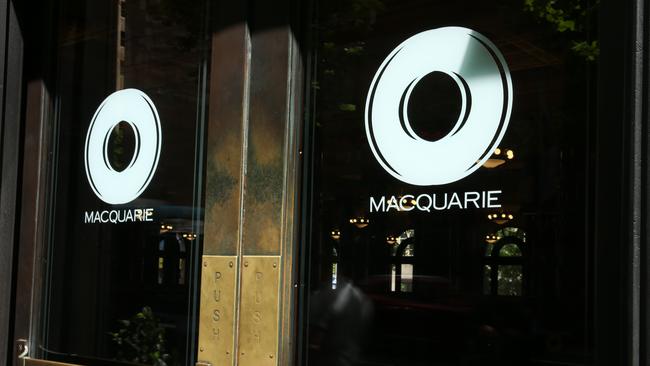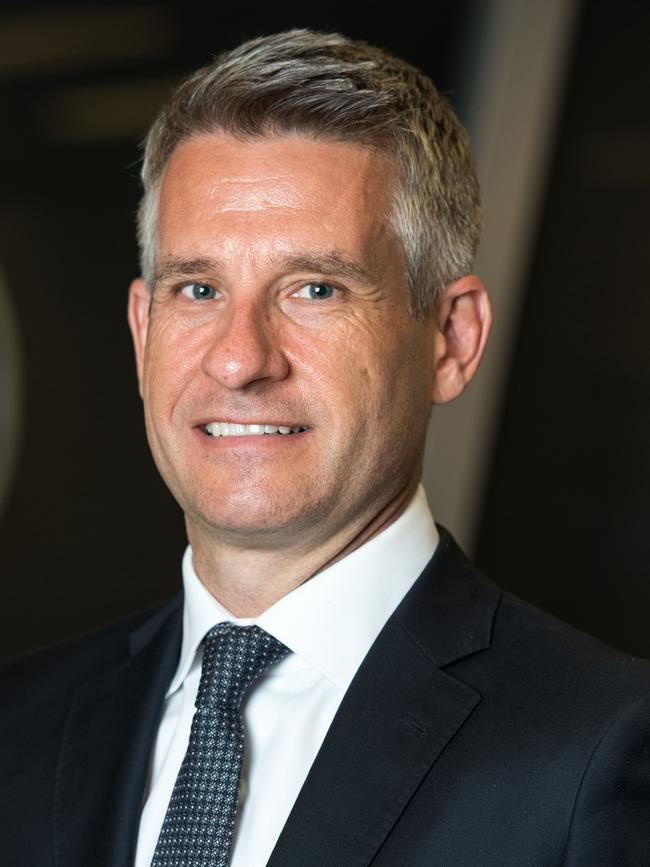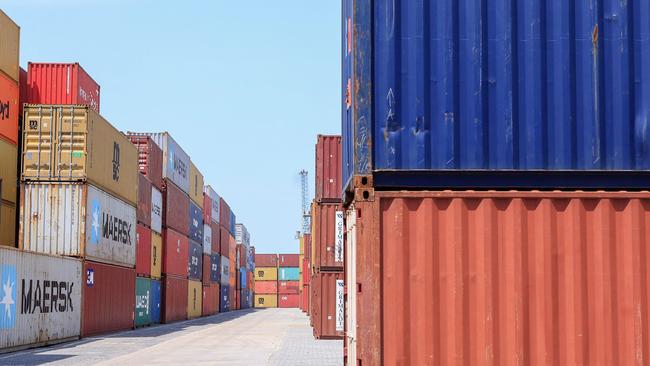How Macquarie has long moved on from AirTrunk
Investment bank Macquarie is about to crack the $1 trillion mark in assets under management, pitting it against some of Wall Street’s biggest names.

Business
Don't miss out on the headlines from Business. Followed categories will be added to My News.
Macquarie’s flagship asset management arm isn’t standing still since its blockbuster $24bn AirTrunk deal.
It was involved in deals across hard infrastructure and tech with an enterprise value expected to reach around $100bn this financial year, and the investment bank is eyeing more action in the year ahead.
This suggests even with Donald Trump causing a shift in global investor sentiment there’s still plenty of buying opportunity to be found. Although, a recent investor roadshow by Macquarie highlighted increasing interest in Europe where valuations haven’t run up as much.
Macquarie Asset Management’s Hong Kong-based boss Ben Way is in Australia meeting with clients where he has been talking about the opportunity across the four “Ds”: Digitisation, decarbonisation, demographics, and deglobalisation.
As interest rates come down Way believes there will be more investment opportunities and his most recent update shows he is sitting on more than $30bn of so-called dry powder.

The first two of these are well known with data centres still offering opportunity for those operators with a proven track record. Way’s team is even prepared to look at green energy even as valuations across parts of the sector like wind and solar, have failed to live up to the hype.
As far as Way is concerned, not all wind farms are the same.
A wind farm offshore New York State with a limited flexibility on pricing is a vastly different proposition to an Asian-based offshore operation that has a big tech customer as a client and price step up built into ultra-long term contracts.
Suddenly the returns proposition looks a lot different for Way and his global pension fund backers.
However, he has told clients, the overwhelming trend for renewables is growth. The world still needs more energy generation and many jurisdictions are putting the call out for experienced operators to delivery it quickly.
The demographics theme plays into an ageing population and healthcare, but for Macquarie it takes an additional twist. The bank is eyeing a rising middle class across Asia where demand for more complex infrastructure including road and rail and airports are changing economies.
Nor is deglobalisation is about to fade away and a raging trade war has added to conviction.
This sees countries and businesses looking to onshore and secure their supply chain which requires new industrial infrastructure, including roads, warehousing, energy and other services. Way’s asset management arm is more than happy to provide the private credit financing to make it happen.

Stepping into this theme is $US2.4bn buyout of a stake in Dow Chemical’s US Gulf coast pipeline, road and energy infrastructure. This has been separated into a new entity Diamond Infrastructure. This closed in December but had been two years in the making.
A recent roadshow with investors in Europe revealed Macquarie’s asset management is now pushing a record $1 trillion in funds it manages on behalf of big pension fund clients. This equates to $US630bn and as a comparison Wall Street giant Blackstone manages $US1 trillion across infrastructure, property and private credit, and Brookfield $US900bn on behalf of clients. It is bigger than Apollo Asset Management’s $513bn. Even after the AirTrunk sale it remains one of the biggest data centre owners globally
The fastest growing part of the Macquarie Asset Management portfolio is private credit. At $347bn this has now outstripped infrastructure, renewables and real estate ($334bn).
North America makes up the biggest chunk of exposure at $387bn and this will continue to drive activity, regardless of the shift in Washington. State governments are some of Macquarie’s biggest partners. Locally Australia, Korea and Japan are seen as big sources of potential deals as well as funding.
Way has told clients in Sydney on the infrastructure side his focus is to be a builder of asset value rather than an asset accumulator. And last year’s AirTrunk deal shows the Macquarie model in action.
Macquarie picked up a 90 per cent stake in the data centre operator for around $3bn just as the Covid pandemic hit. Since then the Australian bank pumped nearly three times that amount to drive its hyperscaler expansion across Asia. In the process Macquarie also put the corporate structure around the business to make it more attractive to buyers and more big tech customers.

Way was the chairman of AirTrunk through much of this time however he stepped aside to put in an independent chair Mark Barnaba in late 2023. At the time Macquarie had been considering a stock market listing, given rising demand for data centres. However Blackstone offered a cleaner exit and fuller price than Macquarie and its backers were likely to fetch in an IPO.
Macquarie Asset Management is one of the big two engines of Macquarie, generating around 25 per cent of group earnings. The biggest at the moment is the markets-facing commodities and global markets that generates up to a third, although earnings there are more volatile. Macquarie rules off its full year accounts on Monday.
By comparison Macquarie Asset Management generates 77 per cent of its income linked to annuity-style investments. That’s up from 57 per cent just four years ago and takes in base and performance fees. Investors generally reward smoother earnings streams with higher share price multiple.
Way has talked up AI investing as part of digitisation – but this is not in the world of chips and super computers. He tells clients AI technology can bring new and substantial productivity benefits in running old world infrastructure.
Here he points to Macquarie’s work owning the Long Beach Container Terminal in Southern California.
The operation is unlike any other terminal operating in a US port with Macquarie moving to full automation of cranes and trucks across the site. This has substantially increased throughput and keep powerful transport unions onside given truck and rail waiting times have been slashed. Ports might not be as sexy as data centres, but they have plenty of untapped potential.
–
New Bolt chair
Privately-backed fintech Bolt Group has taken the next step naming banker David Foster as its next chair. Foster was the former Bendigo Bank chair and resigned from Star Entertainment early last year following the casino’s clash with the state gaming regulator.
Foster is the current chair of insurer Youi and was the one-time boss of Suncorp’s banking arm. Foster was part of the board that oversaw the initial growth phase of the digital lender Up. Foster was appointed chair of Bendigo in 2023, but stepped down last year.
Sydney-based Bolt already offers payments technology for banks and has member status with MasterCard, but founder Jared Feng is eyeing a move into the consumer market by building a payments “super app” for Australia.
This will see a single app used to make payments through social media as well as tying together wealth management, multi-currency foreign exchange or even share trading. So called virtual bank Revolut in the UK would be seen as the closest example. The addition of Foster as independent chair, suggests Bolt is eyeing a bigger role in the APRA-regulated banking market over time.
eric.johnston@news.com.au
Originally published as How Macquarie has long moved on from AirTrunk



